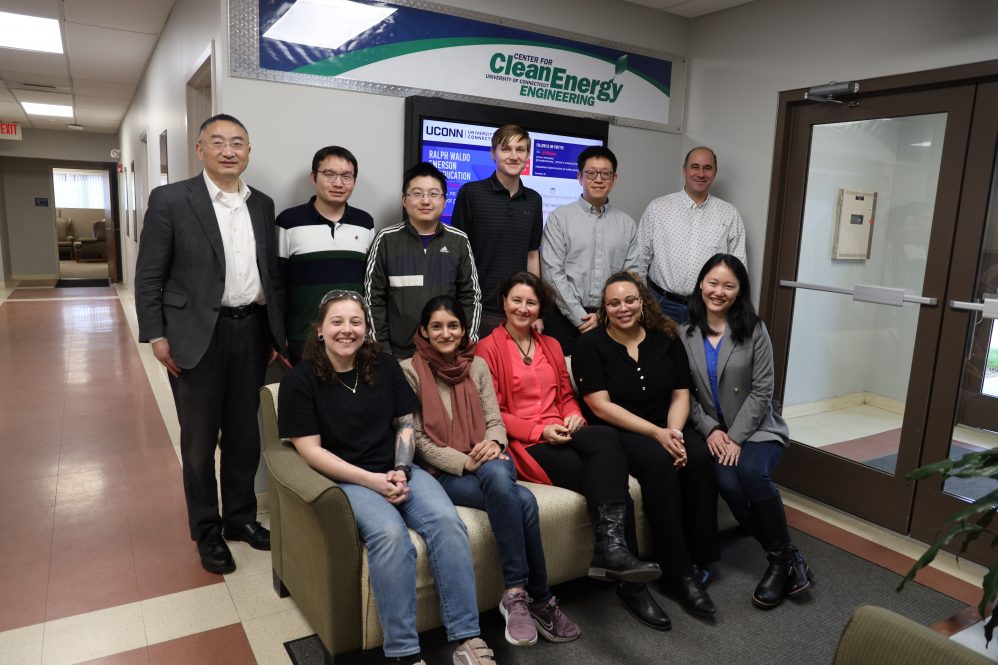UConn is one of dozens of beneficiaries in funding program to bolster research into hydrogen energy and related projects

Researchers from the Center for Clean Energy Engineering are conducting collaborative projects funded by the federal Department of Energy.
UConn is a partner in three important projects with industry that have been selected to receive significant federal funding as the Department of Energy (DOE) seeks to advance hydrogen energy technology.
In March, the DOE announced $750 million in funding for 52 projects nationwide, many of them pairing university research with industrial production. The funding is the first phase of the Bipartisan Infrastructure Law, which authorizes $1.5 billion for clean energy projects and aims to create thousands of new jobs. Additionally, the selected projects will provide support to 32 disadvantaged communities across the country.
"Clean energy technology presents so many opportunities for our state and country," says Pamir Alpay, UConn's vice president for research, innovation, and entrepreneurship. "Beyond the critical importance of producing clean, renewable energy that mitigates the impact of climate change, the industry's growth brings with it excellent employment opportunities and the chance to establish Connecticut as a leader in the field."
UConn faculty are directly involved with three of the funded projects, each relating to electolyzers - devices utilized to split water atoms into hydrogen and oxygen, allowing generation of green hydrogen as a clean energy carrier and a carbon-free feedstock for a number of industrial processes. The work continues a legacy of University researchers collaborating with private and public entities to advance fuel cell technology.
"This is the largest hydrogen program ever to come out of the Department of Energy," says Jasna Jankovic, an associate professor of Materials Science and Engineering and Center for Clean Energy Engineering (C2E2), and one the primary investigators being funded. "This is really a huge moment in the story of clean energy and we are very happy to be selected with our collaborators to continue our work."
Jankovic is involved in two of the projects as the UConn PI. She and co-PI Qian Yang, Assistant Professor in the School of Computing, are collaborating with the National Renewable Energy Laboratory (NREL) and Plug Power Inc., the lead of the project, on gigawatt-scale electolyzer component manufacturing and assembly, a project receiving $45.7 million in total funding. UConn will receive approximately $1.9 million of that funding.
Associate research professor for the UConn C2E2 Stoyan Bliznakov is a co-P.I. with Jankovic on a second manufacturing project. They are working with the Farmington-based Mott Corporation on advanced porous transport layer design and manufacturing for electrolyzers. UConn's portion of the $10 million grant is approximately $2.1 million.
C2E2 and UConn researchers, PI Xiao-Dong Zhou and Co-PIs S. Bliznakov, S. Santos, Y. Wang, and N. Xu, are beneficiaries of the third grant, led by NexTech (d.b.a. Nexceris), funding work on scaleup and demonstration of high temperature electrolysis technology. Collaborators include Georgia Tech, the Idaho National Laboratory, Clark Atlanta University, and Florida A&M. Of the $30 million for the project, UConn will receive close to $1.7 million.
According to C2E2 Director Xiao-Dong Zhou, UConn's role will continue to build understanding of best techniques to manufacture fuel cells. The industry collaborations allow researchers to understand scaling through the interpretation of system-level data.
"In many ways, producing hydrogen focuses in green energy by using water as the source," Zhou says. "Dr. Jankovic and her team are focused on the low-temperature side of things. Other members are working on hydrogen sourcing. UConn has expertise and experience in both areas."
UConn's research and interest in clean energy technology runs deep. President Radenka Maric - herself a world-renowned researcher and expert in clean energy - has declared climate change as one of the most critical issues facing the world.
"These projects support the initiatives that President Maric lay the foundation for and will contribute to our recognition as leaders," Jankovic says.
The DOE estimates that the awarded projects will create 1,500 new jobs and reduce the cost of clean energy production. Thousands of additional jobs will support regional economic activity as communities grow the industry.
Stephany Santos, UConn's executive director of the Vergnano Institute for Inclusion, is pleased with the DOE's mission to support underserved communities. She says that the process of generation clean energy can sometimes have "dirty" side effects, notably the sources of materials used.
"We are supporting communities that have historically been marginalized," Santos says. "We are ensuring that those involved are not being exploited and that resources are cleanly sourced."
At UConn, the projects are creating invaluable opportunities for students to learn from top faculty, as well as contribute to research. Fullbright Scholar Mariah Batool, a Ph.D. candidate in Materials Science, who will work as a postdoctoral fellow on the project with Plug Power, says she has been presented with a huge opportunity.
"It is allowing me to employ all my knowledge and expertise in a more practical approach to bringing forth clean energy advancement, not just only in the academic sense but also in practical and industrial spaces."






